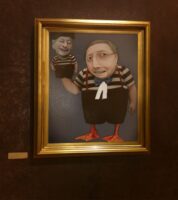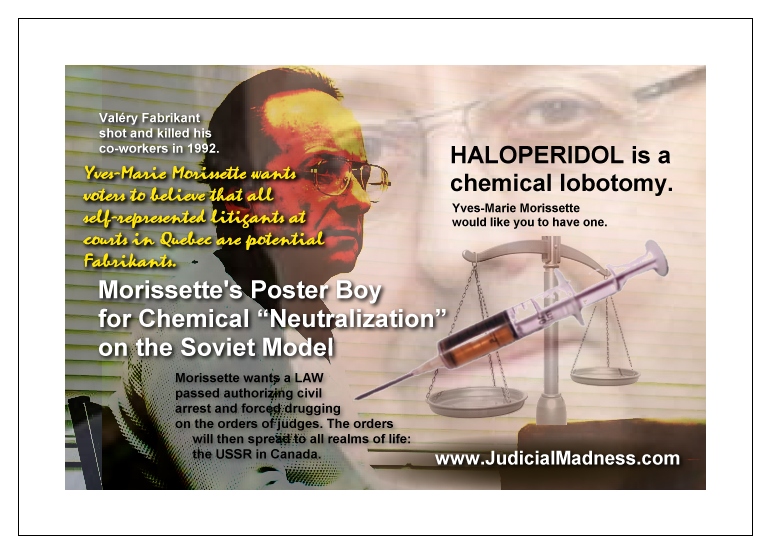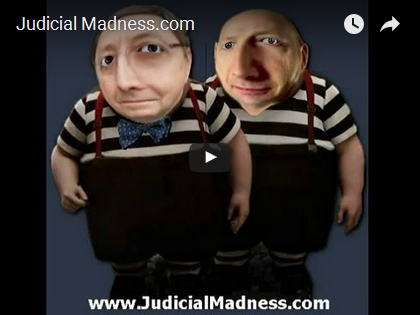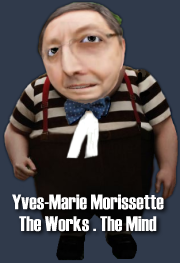Querulents… we all know one!
Source: Le Journal, Barreau du Québec, June 2006, p. 5
Les quérulents… on en connaît
tous un ou une !
Querulents…
we all know one!
|
Conférence des juristes de l’État
|
Conference of State lawyers |
|
Au menu: Quérulence, accomodement
et Pro Bono |
On the menu: Querulousness, compromise and Pro Bono
|
|
Annie Lafrance |
Annie Lafrance |
|
Quand l’avocat se fait altruiste par ses actions dites pro bono, qu’en est-il de sa responsabilité professionnelle ? Les conditions de travail des avocats permettent-elles un équilibre avec l’engagement gratuit ? Religion et droit sont soumis à quels jeux d’équilibriste ? La conciliation, certes, mais comment la réussir ? La quérulence : trouble de la personnalité qui trouble les tribunaux ? Voilà quelques-uns des sujets abordés par la 173 Conférence des juristes de l’État, tenue à Québec le printemps dernier, et auxquels le Journal du Barreau fait écho. |
When a lawyer plays the altruist in virtue of his so-called pro bono activities, what about his professional liability? Do the working conditions of lawyers allow for balancing the gratuitous undertaking? To what balancing acts are religion and law subject? Conciliation, certainly, but how to achieve it? Querulousness: a personality disorder which disorders the courts? Those are just a few of the subjects broached by the 173 State lawyers at the Conference held in Quebec last spring, and on which the Journal du Barreau reflects. |
|
Il est ardu, voire éprouvant de faire face à des quérulents, ces gens qui ont une forte tendance à chercher des quérelles et une propension à multiplier les recours juridiques. Pour y faire face et garder son sang-froid, le Dr Evens Villeneuve, psychiatre au Centre hospitalier Robert-Giffard, suggère de dépersonnaliser le conduit et de bien respecter son cadre d’intervention. |
It is arduous, even nerve-wracking to be faced with querulents, these people who have a pronounced tendency to seek quarrels and a propensity for multiplying legal recourses. In order to deal with it and keep one’s cool, Dr. Evens Villeneuve, a psychiatrist at the Robert-Giffard Hospital, suggests depersonalizing conduct and striclty adhering to one’s framework of intervention. |
|
« Il ne faut surtout pas acheter la paix ou agir sous l’effet d’une émotion forte. Cela pourrait non seulement nuire au dossier et à la justice, mais aussi vous nuire personnellement et miner votre professionnalisme », a-t-il indiqué. Plusieurs participants à la Conférence ont profité de la présence du psychiatre pour exposer leurs problèmes. « Si vous sentez que la situation vous dépasse, discutez avec vos collègues et prenez le temps d’eclaircir les données. Il ne faut rien brusquer. De toute façon, le quérulent reviendra à la charge », leur a conseillé le psychiatre. |
“In particular, one should not buy the peace or act under the influence of a strong emotion. That might not only prejudice the file and justice, but also harm you personally and undermine your professionalism”, he indicated. Several participants in the Conference benefited from the presence of the psychiatrist to air their problems. “If you feel that the situation is beyond you, discuss it with your colleagues and take the time to clarify the facts. Don’t act without due deliberation. In any event, the querulent will try again”, the psychiatrist advised them. |
|
D’abord MOI, puis MOI, et encore MOI |
ME first, then ME, and ME again |
|
Mais qui sont les quérulents ? Près d’une centaine d’entre eux ont été officiellement déclarés au Québec ces dernières années. Le portrait type d’un quérulent est un homme âgé de 40 à 60 ans, de scolarité moyenne ou avancée, et qui a une très bonne estime de lui-même. « Même qu’il a développé un surmoi caractéristique chez certaines personnes ayant des troubles de la personnalité, comme les narcissiques. » |
But who are the querulents? Close to a hundred of them have been officially declared in Quebec in recent years. The standard portrait of a querulent is a man aged from 40 to 60, of average or advanced schooling, and who has a very good opinion of himself. “He may even have developed a super-ego characteristic of certain people with personality disorders, such as narcissists.” |
|
Victime ? Oui … d’une « serieuse maladie » |
Victim? Yes… of a |
|
Selon le Dr Villeneuve, les quérulents croient qu’ils sont victimes de la société, convaincus que quelqu’un les a trahis. L’exemple le plus connus au Québec est M. Fabrikant, un ingénieur aujourd’hui déclaré « plaideur pathologiquement processif » qui a multiplié les recours judiciaires en quelques années. |
According to Dr. Villeneuve, querulents think they are victims of society, convinced that someone has betrayed them. The best known example in Quebec is Mr. Fabrikant, an engineer who today has been declared “a pathologically litigious litigant” who has multiplied legal recourses in a brief span of years. |
|
Hypocondriaques de la justice |
Hypochondriacs of |
|
« Il existe un lien avec l’hypocondrie, qui est une maladie reconnue, où le souffrant assiège les salles d’urgence, alors que le quérulent fait de même avec les tribunaux », a pour sa part illustré le juge à la Cour d’appel Yves-Marie Morissette, qui s’intéresse à la quérulence depuis quelques années et souhaite que le débat passe de la psychiatrie au juridique. “ Une fois acquis que la quérulence est véritablement un trouble sérieux de la personnalité, voire une maladie grave, il me semble que le droit doit s’appliquer à en minimiser les effets dommageables, tant pour ceux qui en sont la cible, y compris les tribunaux, que pour ceux qui en sont atteints », a-t-il soutenu. |
“There is a link with hypochondria, which is a recognized illness, where the sufferer besieges the emergency rooms, whereas the querulent does likewise with the courts”, illustrated Court of Appeal Judge Yves-Marie Morissette, who has been interested in querulence for a number of years and would like the debate to move from psychiatry to law. “Once it is understood that querulence is truly a serious personality disorder, even a grave illness, it seems to me that the law must be applied in order to minimize the detrimental effects, as much for those who are the target, including the courts, as for those who are afflicted”, he argued. |
|
Le quérulent coûte une fortune au contribuable |
The querulent costs the taxpayer a fortune |
|
Il demande donc que les quérulents reconnus par le système judiciaire soient « privés de la capacité du droit d’ester en justice ». Pour l’heure, 58 quérulents québécois reconnus sont étiquetés « plaideurs vexatoires » et doivent obtenir la permission d’un juge avant d’intenter une poursuite. « C’est un pas dans la bonne direction, mais ce n’est pas suffisant », croit le juge. Puisque les quérulents engagent des procédures judiciaires coûteuses pour la société et « énergivores » pour le personnel judiciaire, ils devraient être davantage limités dans leur champ d’action, et ce, dès qu’ils s’adressent aux tribunaux ou à un bureau de service à la clientèle, lieu où ils déposent bon nombre de plaintes, soutient-il. |
He therefore asks that querulents recognized by the legal system be “deprived of the capacity to exercise legal proceedings”. At the moment, 58 recognized Quebec querulents have been labelled “vexatious litigants” and must obtain permission from a judge prior to instituting a law suit. “It’s a step in the right direction, but it’s not enough”, the judge believes. Since querulents engage legal procedures that are costly for society and “voracious” of the stamina of legal personnel, they must be further limited in their field of action, and this, the moment they address the courts or a customer service bureau, where they lodge numerous complaints,” he contends. |
|
En attendant qu’il fasse faillite… |
Wait until he goes bankrupt… |
|
Pour le juge Morissette, le problème de la quérulence est double du fait que la plupart des quérulents se présentent seuls devant la justice et deviennent une charge supplémentaire pour le personnel de la justice. |
For Judge Morissette, the problem of querulousness is doubled owing to the fact that the majority of querulents represent themselves before the courts and become an additional load for justice personnel. |
|
« Selon moi, la seule façon de gagner avec un quérulent qui ne veut pas se faire traiter ou suivre par un médecin est d’attendre qu’il fasse faillite. Ce qui arrive dans plusieurs cas », conclut Dr Villeneuve. |
“In my view, the only way to win with a querulent who does not wish to be treated or followed by a doctor is to wait until he files for bankruptcy. Which happens in a number of cases,” concludes Dr. Villeneuve. |





